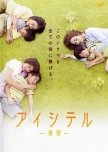
Nihon Boro Yado Kiko
9 personnes ont trouvé cette critique utile
Once Upon A Time, There Was A Shabby Hotel!
I guess we read & listen to stories to discover something new & unexpected, but this doesn't mean that a good story doesn't have repetitive & expected elements. As kids, we learn this as soon as we hear our grandmoms tell us for the second time: "Once Upon A Time ..." One role of this is to make us feel at home and friendly: "Sure, we were there before!"The short series, Nihon Boro Yado Kiko (2019), is full of repetitions: Shabby hotels, one and only one song sung at every single episode, same fights, and so many others, however, the series miraculously uses all these to make us feel at home, and as some kind of framework for its new, innovative elements. And in the end, we'll have a product One Of A Kind! Story-telling at its best!
As someone who tends to be suspicious, even hateful of, the old, I started the drama with zero expectation, but now, I'm really going to miss Haruko saying: " 'Shabby Lodgings', That's by no means an insult!" I'm now a believer!
My Rating: 10/10
Cet avis était-il utile?

Shino Can't Say Her Own Name
8 personnes ont trouvé cette critique utile
Cette critique peut contenir des spoilers
The Struggle to Find your Place in the World & the Magic of Friendship
Imagine yourself as a teenage student in a foreign country, where you barely know the language, plus that many people are ready to make fun of you. There, your main concern could be to not make mistakes. Moreover, you might want to avoid crowded places, as more people around raises the risk of being ridiculed, plus that higher number of people laughing at you makes your pain more horrendous. It's like that you are in the enemy camp, feeling constant fear and anxiety. But let's suppose that the situation isn't all gloomy, since among that scary crowd, there are right people for you. The question is that how you can make things better. Naturally, the first challenge is to find some individuals looking sympathetic. If things go well, you'll gain some allies, and besides, some space to breathe comfortably. In fact, your life, properly speaking, begins with such a friend. Then, after gaining enough confidence through friendship, it'll be the time to embrace the public properly. This will be your second challenge. Let’s call the first challenge ‘creating a safe haven’ and the second, ‘finding your voice in society’.The situation with its two challenges is depicted delicately in “Shino can't say her name”, the story of a high school freshman. Shino suffers from a psychogenic speech disorder, such that she's felled by a severe stuttering in front of others. This makes the beginning of her high school a real nightmare. Not giving up, she looks for some hope and in Kayo, a self-possessed and attentive loner classmate, finds what she wishes. Things go well between them, as Kayo does her part as best as you can imagine. They make friends and after the discovery of Shino's beautiful voice by Kayo, our guitarist, 'ShinoKayo'—their music band—is born. With Kayo's support, Shino gradually feels more confident, starting to talk to the world. If she experienced Hell in the first days of school, with Kayo, she’s kind of manages to “bribe God” and “got a passport to Paradise” as she sings Blue Heart’s song, ‘Aozora’. It seems she needs nothing else.
This is the first half of our story, however, things don't keep going smoothly. A classmate guy— Tsuyoshi—joins their band. Kayo sees this just as expansion of their music experience, though it's a different story for Shino. If with Kayo alone, she could easily forget her speech impediment, now, two normal-speaking people are communicating easily with each other before her. As she can't keep up with them, all the painful experience of being the 'outsider' comes back. Nothing is changed with Kayo, but anyway, Shino feels that her safe haven is gone. In her heart, she angrily asks her dear friend: “Why did you let a stranger intrude our space and destroy our heaven?” But she is aware that it's silly and selfish to want Kayo to be only hers. In the face of this complicated and painful situation, Shino runs away to the old shelter, her room. At the same time, their friendship is too precious to say goodbye to this easily. There is a strong gravitational pull from Kayo's side. This is Shino's dilemma.
And here is the second challenge: Shino might have the best time with Kayo but hiding behind her can't work forever. She needs to face the world herself, otherwise even their invaluable comradeship turns to a destructive addiction (How many promising relationships are destroyed due to over-dependence of one side on the other!). In the meantime, as discussed between them before, Kayo writes a song about “the stuff that happened between them” and sings it at the school festival. This gesture of unwavering friendship removes Shino’s last doubts. In front of everyone, she finally talks about her speech problem properly and introduces herself: “I’m Oshima Shino, from now on, forever!” She becomes part of school.
But a story of friendship is incomplete if we only talk about one side. If the togetherness has some magic, it can't work just on Shino, so how about Kayo? However confident she might be, as a teenager and a human, she also has her own weaknesses, most importantly the insecurity about her tone deaf. But as she tries to support Shino, as well as to manage their treasure—‘ShinoKayo’—she herself becomes stronger. It's being with Shino that gives Kayo enough courage to play the guitar outside home and it's for Shino that she sings at the festival, despite the fact that she knows some people will laugh at her bad singing, something that she hated to confront in the past.
Some viewers might find the last scene showing these three 'friends' separately, each doing their own stuff, disappointing. “Why don't they make music together?”; one might ask. However, what is seen is their friendship in full blossom. As for Shino, she told us before what she needed most: becoming "a normal high school student". And this is what we are witnessing: A nice girl, impressed by Shino's self-expression at the festival, wants to be her friend. Shino's world is expanding, and this is one fruit of her strong bond with Kayo. And even this is the case with the annoying guy, Tsuyoshi: His failed but honest attempts to be a member of 'ShinoKayo' made him notice that instead of forcing himself on others constantly, he needs to take some time to find himself: Now we are seeing him in a lonely corner of the school, a spot that Shino and Kayo were before. And the kind soul—Kayo: More determined and confident than ever, she is playing the guitar on the school rooftop in order to follow her lifelong ambition to be a musician. So, their friendship magically put each of them in the exact place that they should be. But no doubt that when its time comes, the trio will remake their band and sing the most beautiful songs for us; this is what their friendship calls for and this is what we wish!
Cet avis était-il utile?

Japanese Dramas: 2020s vs. 2000s
I really loved Rojo no Ruka (2024), but it made me damn sad, because of this:In old doramas, happiness & warmth were found after years of pain & loneliness, but when people gained them, they had them for eternity. Even if a character left this world (which happened a lot), their warmth remained intact for others, kind of uniting them, making them 'one'.
However, now, it's totally different: Sure, there are heart-warming moments here and there, but in the end, individuals are individuals, having to deal with their own problems by themselves.
So I'd say the Japanese society has changed deeply.
My Rating: 9/10 (I appreciate its honesty, among other things).
Cet avis était-il utile?

House of Hummingbird
4 personnes ont trouvé cette critique utile
A Messed-up Family & A Sister As Your Saviour
I love J-drama: best at showing how family should be, but to know how a messed-up family looks like, we need a work like the Korean movie, "House of Hummingbird"!Eun Hee's family might seem fine: hard-working parents, caring for their kids' future; but looking more closely and you see a messed-up family: The foundation-father-mother relationship-is deeply damaged, hence other problems like emotional neglect, even physical abuse come; A Cold Family, Indeed!
Expectedly, for Eun Hee, finding warmness outside is the main issue, but unlike many kids in her situation, she is not hopeless, entering abusive relationships. On the contrary, there is something beautiful, something powerful in her which attract people. But from where she got this? The answer should come from her older sister, Soo Hee: Despite the fact that she has her own problems and can't support Eun Hee as one wishes, there is something warm flowing between them. In truth, 'Family' only begins with strong sisterly bond between the two. And it's not just this: The sister with her nice boyfriend provides a good relationship model, showing Eun Hee what exactly she should look for.
The rest is Eun Hee's constant attempts to find warmness outside her home: with her good buddy, with her not great-not terrible boyfriend, with the girl who falls in love with Eun Hee, and surely, with her Chinese teacher who acts as a mother-friend.
Sometimes Eun Hee fails, sometimes she succeeds, but in all these, you can see that she is taking strong steps toward a brighter future, so it's impossible to not be an optimist!
Cet avis était-il utile?

Cette critique peut contenir des spoilers
Starting promising, but then failing at everything else
As a lover of Japan, I'm curious to know why many Japanese people, especially the young, admire the western countries and even wish to live there. The movie gives me some good answer, at least some clues. I mean if the depiction of the working environment captures more or less what is happening now in some Japanese workplaces , I personally can't bear it for a week. So, I'm happy that I saw the movie. However, aside from depicting the working atmosphere and how it pushes people to the edge, the movie fails at everything. Let me just discuss the most important one: Its 'solution': leaving the job and finding joy in working in some poor country for the poor. Is this really a solution? I can see two main problems:First, I'm fine with leaving the job, but not in this passive way, with just a smile. So what will happen to the next young man or woman who is going to replace the guy? If the guy feels responsible for some poor people in a foreign country, why doesn't he feel sympathy for his replacement? For this reason, I dislike the way he left his workplace. He didn't have to punch that shitty superior, but he really needed to take some measures, maybe a formal complain letter or something else. At least, he should try, if he had some respect for all the pain and misery he went through, and if he felt responsible to other and future employees.
Secondly: If the guy, after being born, growing up, and living for years in Japan, can't change things in his own country and working environment a bit, how can he change things in other countries? Now, if someone tells me that this Japanese young man can't even try to change things a bit in his own country, I would just conclude that nothing can be changed in our world. So, it's better to not fool ourselves with the fantasy of making some poor people in a foreign country happy.
Cet avis était-il utile?

Cette critique peut contenir des spoilers
Falling in Love with your Wife's 'Daughter'?
It sounds terrible, 'Lolita'-like, but in 'Choki', it might be very different:Naoto & Kyoko are a happy couple. Saki, a 7-year-old girl attends Kyoko’s calligraphy class. Abused by her own mother, between Saki & Kyoko, some kind of daughter-motherly relationship grow.
10 years passed. Kyoko's died and now, Naoto lives with the memories of his beloved wife. Saki, now blind, suddenly shows up, looking for Kyoko. Kyoko isn't there anymore, but her memories bring Naoto & Saki together. Gradually, they grow feelings for each other, but this is like a taboo for Naoto: How can he be in love with his beloved's 'daughter'? How can he betray Kyoko in this horrible way?
It's up to the audience to decide if the relationship is fine. To me, though very complicated, the relationship is like a present from Heaven by Kyoko for these two aching souls: I wish them the best!
Cet avis était-il utile?

The Queen's Classroom
2 personnes ont trouvé cette critique utile
Cette critique peut contenir des spoilers
I love this drama for many reasons, one of them is this cute little girl, Kazumi!However, if the story is taken seriously, it conveys a wrong, in fact, dangerous message. The teacher basically becomes a big bully to teach kids how to deal with bullies. She does all terrible things to her students, making an atmosphere in her class that encourages bullying. And when a student is bullied by her classmates, she does nothing with the excuse that if she does anything, it just makes the situation worse. Bullies are free to do whatever they want and all the pressure and blame is on bullied kids to do something.
So, the whole idea is to make the situation for these 12-year-old kids so horrible that makes them do something about it. Maybe this was the traditional teaching method in the far past, but now, it's more for psychopaths. I hope no one takes this aspect of the drama seriously.
To be fair, as said, there are many good things about the drama. Especially, I really enjoyed the sisterhood between Kazumi and her older sister. I really wish I'd had such a sister!
To summarize, it's highly recommended to watch, but not as a serious stuff on teaching methods!
Cet avis était-il utile?

Becoming 'Father' without Committing any Crime!
'Daughters' (2020) is about two young girls, Koharu and Ayano, living together in Tokyo. They have good jobs and enjoy their carefree lives and friendship till one of them, Ayano, becomes pregnant from a one-night stand. This is a big shock for Koharu. There are two options available for her:
1. Not accepting any responsibility: Ayano has made all the decisions by herself, not asking for her friend's opinions, so it makes sense if Koharu goes with this option.
2. Accepting a role like 'the father', as Ayano doesn't tell the real father about the story.
Sadly, there is no third option between these two extremes for her: All or nothing.
Koharu goes with the second option, so she constantly has to adjust her life to fast-changing situation of the mother. This is not fun for sure! And the main story is about this: HOW THIS PREGNANCY PERIOD AFFECTS THE GIRLS' FRIENDSHIP.
As I just finished it, I can't say how good the movie is (disregard my ratings, MDL made me give some ratings!), but the theme was really new and interesting to me!
Cet avis était-il utile?

Specifically, the sympathy of the victim's mother toward the perpetrator's mother is out of this world, reminding 'Yui' in Haha ni Naru (2017). This doesn't mean that in the end, there is total forgiveness and peace between the two families. It's not supposed to be like that. But the sympathy helps everyone understand their own role, as well as others', rather than only blaming 'enemies'. Now, instead of living in the dark, they know why the tragedy happened: There is some prospect for getting over it and having a brighter (less dark) future.
I don't know what percentage of Japanese people can act like this in the horrible situation, but it seems to be a meaningful difference between the Japanese society and many other countries. I like to think in this way.
Cet avis était-il utile?

My SO Has Got Depression
2 personnes ont trouvé cette critique utile
Cette critique peut contenir des spoilers
Beautiful movies! I'd like to say two things:1. It's about a couple: The husband, Mikio, got major depression and his wife, Haruka, tries her best to help him. It's not unusual, I can see that everywhere in the world, especially in countries that family plays a big part, this might happen. However, what I find interesting is that here, we have a beautiful combination of emotional investment and scientific approach in Mikio. At least I can say that the second element is more or less lacking in my country: people would show lots of emotions in such situation, but it's not backed with some scientific knowledge. In fact, many times, bare emotions produce more harm than benefit. I think Japan is one of the best in combining heavy emotions and exact science. The conclusion is that be ready to learn one thing or two about depression while you watch a romance. It doesn't happen everyday!
2. We all know how much the Japanese emphasize hard work. In any occasion, whether it's called for or not, you can see them saying Ganbarre! Otsukaresamadeshita! ... I like this, however, this movie gave me an interesting insight. Unlike her husband, Haruko is not that hard-working, but she has a good reason for that. She thinks putting too much pressure on yourself can be problematic. This makes her husband mad, but Haruko knows better! And in fact, it's her husband's approach that causes problems: He feels so much responsibility at work that at some point he has no energy to keep going. Like many hard-working Japanese people, he got depression and the rest of the story. Working hard can be counter-productive.
So, it was interesting to me to hear for the first time in a Japanese film this: "Do not work hard"! "I don't work hard!" and things like that. This should sound weird to Japanese ears!
All in all, I'd recommend this beautiful movie with two memorable moments: When Haruko finds Mikio kind of trying to commit suicide in the bathroom and when in church and before their friends, they talk about life with depression: Mikio's speech is amazing.
Cet avis était-il utile?

Walls Are Comming Toward You!
You're imprisoned in a room. This is not nice, but can be tolerable in some situations, however the real disaster is that the walls are coming toward you gradually, so your body is gonna crushed sooner or later. In other words, time is your main enemy.Then how can you enjoy this situation? How can you do anything meaningful? How can you care about others, especially those who are outside such room?
Aya, her family and the Japanese culture tell you how!
Cet avis était-il utile?

Cette critique peut contenir des spoilers
An Unbelievably Equal, Lovely, & Cute Romance When All Odds Are Against You!
I think the story is open to interpretation: A realistic one and a supernatural one. Maybe it's made this way to let the viewers see it as they like, so less be hurt by the tragedy. But either way, the main theme is the same: The temporary nature of life and everything in it, also the risk of being hurt that loving someone can bring to our lives, to the point that sometimes makes suicide a very reasonable choice. What do we want to do? Can we really enjoy this?We all know the answer that a typical J-dorama gives us. And "Neko" isn't an exception. But what makes this one special is how lovely, how equal & balanced, how cute, the relationship of 'Mineko' and 'Koji' is! It's like you're on Titanic, the ship is drowning, and you sing the most heavenly song ever! What is it like? Watch 'Neko' to find out! Another question: Can humans really do this? 'Neko' thinks so! Japan thinks so! And I'm in complete agreement!
Cet avis était-il utile?

"A Totally Voluntary Family"
I enjoyed both Hotman 1 and 2.1. Maybe the best thing is that we see "A Totally Voluntary Family". A very young man raises a newborn, found with a note claiming that it's his kid. Besides, he invites 4 of his half-siblings who have problems with their other families. So, a family of 6 that could've easily lived separately.
2. And the worst side of the drama should be about this brother's character (treating everyone else as a little kid, using physical strength, meddling in others' private life, ...). Still, in the end, everyone's smile and happiness is his ultimate priority, so he's smart enough to notice his faults, apologize and fix them up. Also, it's good that the younger siblings keep their grounds more or less. So as a typical J-drama of the 2000s, we can see this 'peaceful' clash between the old paternalistic culture and the new generation's penchant for freedom & independence.
Overall, a nice heart-warming family drama with a supercute, adorable little kid, 'Nanami'!
Cet avis était-il utile?

Cette critique peut contenir des spoilers
Mom Hating Her Own Daughter!
The premise seems weird and creepy: The mom (Yuriku) sees her daughter (Rika) as an iguana, an ugly lizard, but this premise captures their relationship well: Rika is a remainder & reminder of the mother's traumatic ugly past, so she hates her daughter to the point of killing her and committing suicide herself. She wants to get rid of her past, but the daughter's existence doesn't let her do so. At the same time, she needs the daughter always beside herself, because by abusing her, she can deal with her uncontrollable anger; this is her revenge for her past. She's addicted to her victim-daughter.The dorama also shows well how destructive the relationship is on the daughter: Soon Rika starts to see herself as an iguana too; she's worthless, only adding pain to the world, better to not exist. Besides, the self-hatred makes her a good target for bullies & people who need to project their anger on others and so on and so forth.
On the other hand, there are things that lessen the tragedy: First, it's the father who equally loves his wife and his daughter, so can bring some hope & positivity to the family, however, because he doesn't acknowledge her wife's hatred toward Rika, he can't play an active role in resolving the issue. His denial strategy fails big time. The little sister also later joins her father to make things better, but maybe the real saviour of Rika is her angel-like friend, Nobuko, who acts as a mediator between Rika and the world she's lost connection for a long time.
My biggest problem with the story is something that's common in J-dorama: Showing sympathy when it's not called for. It's true that the mother is a big victim herself, but in any case, she hurts and ruins Rika's life. She needs to be stopped in one way or another, but the drama and the last episode, in particular, kind of justifies her toxic relationship with her daughter, as though no direct solution to the problem was needed.
The dorama's very old, so you should expect many (unpleasant?) things common in that era, but it's Gold! If I consider its production year, I'll give it 10/10, but based on our time rating criteria, 8.5/10 would be my choice!
Cet avis était-il utile?

Is it fine if a 14-year-old girl becomes a mother?
I'd say in our time, in 99% of situations: NOOOOOOO, but '14-sai No Haha' shows that 1% exception:A wealthy society with the best medical service, decent laws, and many more favourable conditions, but let me say some words about the most important factor: The Family of this Teenage Mother!
A man and a woman marry & live with love, so they could bring up their kids as best as one wants. This means, even at 14, 'Miki' (Mirai Shida❤️) is full of love, confidence and power. She begins a romantic relationship with a nice 15-year-old guy. Due to inexperience, her first and the best possible experience of sex leads to pregnancy, but soon she grows strong motherly feelings that make abortion out of the question. It's true that she can't be a normal junior high-schooler anymore, but her family & society are ready to support her and she can have everything necessary at her own pace. Because of her age, I don't think 'Miki' is able to be a full-time mother, but she's totally capable of being a good part-time mother. As her family and others do the rest, there shouldn't be a real problem. Overall, both 'Miki' & the baby, 'Sora', will be fine, I think.
More generally and even in normal cases, I think it's a good idea if parenthood is shared by more and more people. It's too much for one or two persons!
There are many things about the drama that I don't like, like that journalist story. I'm also not a big fan of its over-dramatization approach, but I think the main theme is elaborated well enough that I can recommend the drama to people who like this topic of teen pregnancy.
Cet avis était-il utile?


 1
1 6
6





















